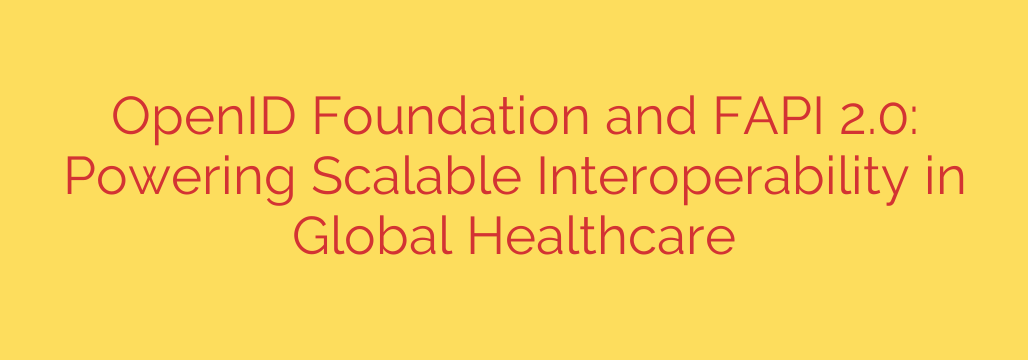
In the complex landscape of modern healthcare, the ability to securely and efficiently exchange patient information across different systems and organizations is not just a technical challenge—it’s a fundamental necessity for improving care, accelerating research, and empowering patients. However, achieving true interoperability is fraught with difficulties, primarily concerning data privacy, security, and the sheer diversity of existing healthcare technologies.
Bridging this gap requires robust, internationally recognized standards that dictate how systems communicate and how access to sensitive data is managed. Two critical players in this arena are the OpenID Foundation and its advanced security profile, FAPI 2.0.
The Challenge of Healthcare Data Silos
Healthcare data often resides in fragmented “silos”—electronic health record (EHR) systems, lab results platforms, imaging databases, and various specialized applications that struggle to talk to each other. This lack of seamless communication can lead to:
- Delayed or incomplete diagnoses
- Redundant tests and procedures
- Difficulty coordinating care across providers
- Slow progress in medical research
- Limited patient access to their own health information
While regulations like HIPAA mandate privacy, they also necessitate secure methods for data sharing when required for treatment, payment, or operations, or when authorized by the patient. This is where strong technical standards become vital.
Standards as the Foundation for Secure Exchange
The OpenID Foundation is a global standards body focused on identity and access management technologies. Their work provides the bedrock for secure interactions online. Building upon foundational standards like OAuth 2.0 (for delegated authorization) and OpenID Connect (for identity verification), the foundation develops profiles tailored for specific, highly sensitive environments.
One such profile is FAPI (Financial-grade API Security Profile). Initially developed for the financial sector to secure open banking APIs, FAPI provides enhanced security layers crucial for protecting sensitive data transmitted via APIs. FAPI 2.0 represents the latest iteration, incorporating lessons learned and addressing evolving threat vectors.
How FAPI 2.0 Powers Healthcare Interoperability
Applying FAPI 2.0 principles to healthcare APIs offers a powerful solution to the interoperability challenge. Here’s how:
- Enhanced Security: FAPI 2.0 mandates stricter security controls than basic OAuth/OIDC, including stronger authentication mechanisms, cryptographic proof of possession for access tokens, and techniques to mitigate common API threats like injection and replay attacks. This is paramount when dealing with highly confidential patient data.
- Fine-Grained Authorization: It enables healthcare providers and patients to grant third-party applications or other providers access to specific types of data for defined purposes, rather than requiring broad access. This supports patient consent management and the principle of least privilege.
- Scalability: By providing a standardized, secure framework for APIs, FAPI 2.0 allows healthcare organizations to connect with a growing ecosystem of partners, applications, and services without building custom, point-to-point integrations every time. This is key for achieving scalable data exchange across states, regions, and even globally.
- Building Trust Frameworks: Adherence to recognized standards like FAPI 2.0 helps establish trust between disparate systems and organizations, which is essential for encouraging data sharing initiatives.
- Supporting Regulatory Compliance: Implementing FAPI 2.0 helps organizations meet the stringent security requirements imposed by healthcare data protection regulations worldwide.
Actionable Steps for Secure Healthcare Data Exchange
To leverage the power of standards like FAPI 2.0 for better healthcare interoperability:
- Healthcare organizations should prioritize adopting API security standards like FAPI 2.0 when building or procuring systems that handle patient data exchange.
- System vendors should build products that are compliant with these advanced security profiles.
- Industry bodies and regulators can promote and even mandate the use of such profiles to ensure a baseline level of security across the sector.
- Developers building healthcare applications must follow best practices for implementing these security standards correctly.
By embracing robust security standards like FAPI 2.0, guided by organizations like the OpenID Foundation, the healthcare sector can move closer to a future where patient information flows securely and seamlessly, leading to improved patient outcomes, accelerated medical research, and a more efficient global health ecosystem. The secure, scalable interoperability powered by these standards is not just a technical upgrade; it’s a transformation for better health worldwide.
Source: https://www.helpnetsecurity.com/2025/07/14/gail-hodges-openid-foundation-fapi-2-0/








